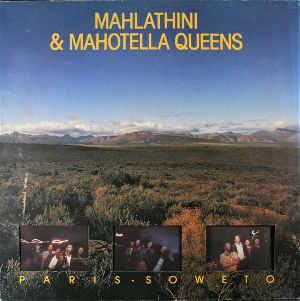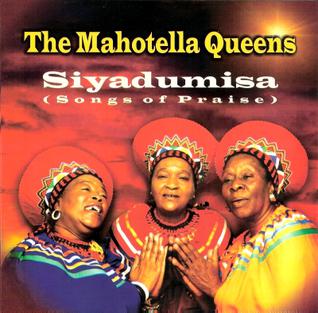Related Research Articles

The South African music scene includes both popular (jive) and folk forms like Zulu isicathamiya singing and harmonic mbaqanga. Other popular genres are Marabi, Kwaito, house music, Isicathamiya, Gqom, rock music, hip hop and Amapiano.

Ladysmith Black Mambazo is a South African male choral group singing in the local vocal styles of isicathamiya and mbube. They became known internationally after singing with Paul Simon on his 1986 album Graceland, and have won multiple awards, including five Grammy Awards, dedicating their fifth Grammy to the late former President Nelson Mandela.
Mbaqanga is a style of South African music with rural Zulu roots that continues to influence musicians worldwide today. The style originated in the early 1960s, and blends traditional African vocal styles and melodies with instruments from European and American popular music.
Dr. Bhekizizwe Joseph Shabalala was a South African singer and musician who was the founder and musical director of the choral group Ladysmith Black Mambazo.

The Mahotella Queens is a South African female band formed in 1964 by music producer Rupert Bopape, consisting of Hilda Tloubatla, Nobesuthu Mbadu, and Amanda Nkosi. The group is noted for their distinct vocal harmony sound, guitar-led mbaqanga music, and fast stage dancing.

Simon "Mahlathini" Nkabinde was a South African mbaqanga singer. Known as the "Lion of Soweto", Nkabinde is the acknowledged exponent of the deep-voiced, basso profundo "groaning" style that came to symbolize mbaqanga music in the 1960s. Nkabinde was also a very active live performer in South Africa, recording and performing with the Mahotella Queens and the backing Makgona Tsohle Band from 1964 to 1971, and then again from 1983 to 1999. The Mahlathini and the Mahotella Queens act was propelled into international stardom in the wake of Paul Simon's 1986 Graceland album.

Mahlathini and the Mahotella Queens were a South African mbaqanga supergroup made up of the three musical acts linked together by talent scout and record producer Rupert Bopape at the Gallo Recording Company in Johannesburg, South Africa in 1964. The group composed of the following three distinct parts:
The Makgona Tsohle Band was a South African instrumental band that is noted for creating the mbaqanga music style. Mbaqanga is an acculturated popular South African music that emerged in the 19th century. Mbaqanga is also referred to as township jive. The group was formed in 1964 at Mavuthela, and became the Mavuthela house band. It garnered success by backing fellow Mavuthela-Gallo stars, Mahlathini and the Mahotella Queens. It is often referred to as the South African equivalent to Motown's The Funk Brothers.

Gallo Record Company is the largest record label in South Africa. It is based in Johannesburg, South Africa, and is owned by Arena Holdings. The current Gallo Record Company is a hybrid of two South African record labels, rivals between the 1940s and 1980s: the original Gallo Africa (1926–85) and G.R.C.. In 1985 Gallo Africa acquired G.R.C.; as a result, Gallo Africa became known as Gallo-GRC. Five years after the acquisition, the company was renamed Gallo Record Company.

The Township Idols is a 2003 compilation album by the South African singing group Mahotella Queens. The group started recording for Gallo Record Company in 1964, initially under different group names in addition to the "Mahotella Queens" name. Although they are prolific recording artists, the songs collected on this album are mainly from the 1990s, licensed from the US-based Shanachie Records.
Hilda Semola Tloubatla is a South African mbaqanga singer, and the lead singer of the acclaimed group the Mahotella Queens. Tloubatla was born in Payneville, South Africa before moving to kwaThema township in 1951 as a result of the apartheid government's 'Group Areas Act' in the country.
Nobesuthu Gertrude Mbadu Shawe was a South African mbaqanga singer, and a singer in the acclaimed group the Mahotella Queens.
Nontsomi Mildred Mangxola is a South African mbaqanga singer, and a singer in the acclaimed group the Mahotella Queens. Mangxola was born in Benoni, Gauteng, South Africa, and loved singing from a young age. She was also a part of local girl group The Daveyton Queens.

Paris – Soweto is a 1987 album by the South African mbaqanga group Mahlathini and the Mahotella Queens. The album was recorded just after the group reunited in 1986, and was one of the first albums to be recorded specifically for the international audience. The album was recorded in Paris and released internationally on the Celluloid label, and under the group's long-standing Gallo label in South Africa. The first single, "Kazet" became one of the group's signature tunes.

Siyadumisa (Songs of Praise) is a 2007 album by the South African mbaqanga group the Mahotella Queens. The album is the first gospel-orientated album by the Queens, and features the voice of lead singer Hilda Tloubatla's son, Alfred "Ali" Temo. The album was released in May 2007 in South Africa on the Bula Music label, and was a joint venture between Bula and AS Entertainment (the Queens' management).

Mathaka Vol 1 is a 1983 album by the Makgona Tsohle Band, the instrumental backing group for Mahlathini and the Mahotella Queens, all of whom were based as musicians in the Mavuthela Music subsidiary of Gallo Africa.
Elias and His Zig-Zag Jive Flutes was a kwela band, formed in the mid-1950s by brothers Elias and Jack Lerole, along with David Ramosa and Zeph Nkabinde. The four young men played on the streets of Alexandra, a township in Johannesburg, South Africa. In the early days they called themselves the Alex Shamba Boys. Jack Lerole was only in his early teens when he and Elias started playing penny whistle. Ramosa and Nkabinde joined them, and they developed a unique sound: Unlike earlier kwela groups, they incorporated guitar and vocal harmony. The "jive flute" in the name Elias and His Zig-Zag Jive Flutes is the penny whistle.
Matodzi Irene Mawela is a South African singer and composer who has been active since the late 1950s. She is known primarily for her contributions to mbaqanga music and songs made in the Tshivenda language, and has contributed to an estimated 1,000 studio recordings and radio transcriptions.
David Gresham is a South African independent record producer, publisher, promoter, and radio & television personality. He is best known for his career on SABC's Springbok Radio show, South Africa's Top 20 and on SABC TV's, Pop Shop. He owns David Gresham Entertainment Group. His career, starting in the 1960s and has spanned five decades.

Mbaqanga is an album by the South African musical group Mahlathini and the Mahotella Queens, released in 1991 and in the US in 1992. The group supported the album with a North American tour.
References
- 1 2 3 4 Max Mojapelo (2009). Beyond Memory: Recording the History, Moments and Memories of South African Music. African Minds. p. 51. ISBN 978-1920299286.
- 1 2 Mandisi Majavu (8 August 2002). "The return of the Dark City Sisters". Johannesburg News Agency.[ dead link ]
- ↑ SABC News (22 July 2012). "SA's veteran singer Joyce Mogatusi laid to rest". SABC. Archived from the original on 29 October 2013. Retrieved 23 October 2013.